Awkward Italian coalition takes shape
- Published

At last Italy's long and traumatic passage through a political limbo appears to be nearing an end.
More than two months after the general election it seems that a government is finally about to take shape.
But it will be an unnatural and unhappy-looking beast.
It will throw the big centre-left Democratic Party (PD) into a coalition with its foes on the centre right, led by former Prime Minister Silvio Berlusconi.
"The left has been driven, by its own incompetence, not only to have to reach a deal but in fact to govern together with its enemy," said a piece in the newspaper La Repubblica.
"A choice 'contro natura'."
Tensions
The task of pulling this administration together has fallen to the mild-mannered, moderate and comparatively young Enrico Letta, the PD's 46-year-old deputy leader.
And the prime minister-designate is now consulting his various potential partners.
This is the business of trying to divide out ministries and areas of influence.
But Mr Letta may find that he has to do some of his hardest bargaining in the ranks of his own party.
The PD is in trouble.
First there was a deeply disappointing election result. Then there were extreme tensions over how to manage the aftermath.
The party is in danger of splitting.
It may be that a substantial slice of its supporters will not back a government that puts the PD into partnership with Mr Berlusconi.
Mr Letta has suggested that the coming together of this administration is not a foregone conclusion.
He has said that when he engages with Mr Berlusconi and the centrists under the current Prime Minister, Mario Monti, there will be limits to what he will be prepared to agree; that the government will "not be born at all costs".
'No alternative'
At the moment at least, nobody seriously doubts that it will indeed come into being.
Behind Mr Letta is the very much more substantial figure of the head of state, Giorgio Napolitano.
In the depths of the party political paralysis in parliament the faction leaders turned to the president for help.
They persuaded him to stay on for an unprecedented second term, and agreed to be guided by him.
So President Napolitano is at the moment wielding huge influence.
He believes that this broad-based coalition arrangement is the only way forward, and he will be intent on making sure that it is put in place.
An MP for the centrist, Scelta Civica grouping, Andrea Romano went so far as to say. "The new government will be Napolitano's government.
"It will be a difficult operation but we really have no alternative.
"Two months after the election Italy cannot wait anymore for a full government to be in power.
"After an election that had no real winner you have no other solution than working together in the interests of the country."
Last call
And those views were echoed by a senior figure in Mr Letta's Democratic Party, Stefano Fassina.
"I think we can have a couple of years - maybe a little less - to amend the constitution and address the economic emergency," he said.
"It will definitely be difficult. It will be very, very difficult.
"But I think that we have no choice. We have to agree to find a middle point."
The disparate factions of the new government may not have too much difficulty working together on certain economic reforms.
Across the spectrum there is a view that Italy needs to ease up on austerity measures.
But it might be much tougher to agree on reforms to the political system.
It may for example be very tricky to reach a consensus on the best way to re-shape the election law, which is widely regarded as being partly responsible for the hopelessly indecisive outcome of the last vote.
But a piece in Corriere della Sera said that the parties know that for them this is "the last call, that they cannot fail".
It said: "They know they would have to pay a very high price if they don't show themselves capable of facing the effects of a devastating economic crisis.
"They know that no one will forgive them if they don't reform the institutions."